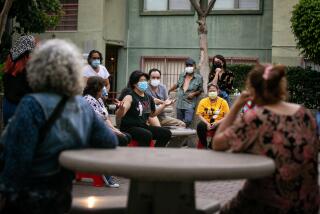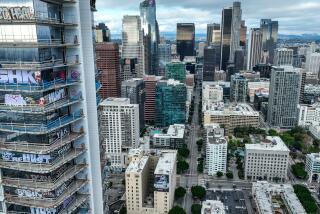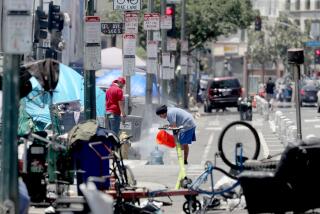At Occupy L.A., no lock step or group think
As cigarette smoke and the scent of burning sage drifted over the crowd at Occupy L.A., a young protester took to the people’s microphone to give a rousing recitation of the group’s “points of solidarity.”
The crowd echoed his words back at him.
“We are daring to imagine,” 300 people chanted. “A new sociopolitical and economic alternative that offers greater possibility of equality.”
The harmony was shattered by a woman shouting wildly. “Why don’t we have a microphone? They don’t want you to think, they want you to repeat!”
“We need to maintain solidarity!” a man in the crowd bellowed back.
“We’re supposed to be fighting the government, not each other!” another yelled.
As the arguing spread and the assembly dissolved, a distraught young woman broke into tears.
It’s not easy running a people’s revolution. As Occupy Wall Street and its sister demonstrations around the globe have unleashed pent-up anger over economic inequities and won support from politicians and labor unions, hundreds of protesters back at L.A.’s encampment are, in addition to carrying out street actions, learning simply how to coexist.
An uncommon mix of people has squeezed into a motley tent city on the 1.7-acre lawn surrounding City Hall: middle-aged Marxists, out-of-work blue-collar workers, lawyers, teachers, train-hoppers and anarchists — along with a rowdier element looking to drink beer and drop acid. The camp’s proximity to skid row has drawn a sizable contingent of homeless.
The protesters pride themselves on being leaderless, but signs of social stratification have emerged. A section north of City Hall has attracted older protesters — many of whom are employed — and has been dubbed “Westwood” by one camper. A thin grassy strip west of City Hall near the portable toilets, where homeless people have congregated, is “skid row,” he said.
::
Compared to Oakland, where police have clashed with demonstrators, or New York, where intellectuals and celebrities have stopped by to rally the protesters with fiery speeches, Occupy L.A. can feel more like a music festival than an uprising, as it did on a sunny afternoon last week.
Tony Johnson got out of county jail a few weeks ago on a drug possession charge and had no place to go. Hanging out in Hollywood, he met some kids who told him about a party downtown. Johnson, 27, who spent much of his youth in foster homes, had never before slept in a tent.
“I can’t complain,” he said. “It’s better than being homeless.”
On the sprawling south lawn, protesters sometimes stay up all night, clustered around drum circles. There, Johnson fell in with the Vibe Tribe, a crew of young travelers who’ve staked out a spot under a tree strung with a hammock.
He was sitting with his new friend, Dax Parsons, 23, a surfer who grew up in Malibu and lives in Venice, next to a couple sleeping together on a pink paisley rug, their limbs entwined.
When 20-year-old Danielle Bootz walked up, dressed in cutoff jeans, with a blanket pulled around her shoulders like a cape, Parsons greeted her as “Mama Bear.”
“This is the mother of the tribe,” he said, smiling.
Bootz sat down and lighted a cigarette. She arrived on the West Coast in August after leaving her hometown of Detroit, where high unemployment and one of the country’s worst housing markets make life “so depressing.” She spent the end of the summer attending music festivals and a few Grateful Dead shows before joining Occupy L.A.
Like many demonstrators, she’ll tell you in the same breath that the protest has been chaotic, frustrating — and the most inspiring thing she’s ever been part of. That similar protests have sprung up worldwide, she says, means people everywhere are looking for change.
A common criticism of the Occupy movement is that demonstrators don’t know what they’re protesting. But when asked, nearly every person will offer a variation of the same complaint: They resent the growing chasm between rich and poor. Bootz and her friends rattled off the culprits: “Political parties,” “Lobbyists,” “The Industrial Revolution,” “Credit.”
What they don’t agree on is how to fix it. Some protesters, like those who want to legalize marijuana, are calling for less government intervention. Others, like those who would like more rigorous regulation of banks, want more.
In a tent known as the People’s Collective University, a bespectacled professor with a bushy white beard sat in a lawn chair surrounded by a dozen cross-legged students. He was nearing the end of a lecture that proposed a new economic model somewhere between “fracturing capitalism and collapsed Marxism.”
“You have been taught that capitalism is based on competition,” he said, “but effective capitalism is based on cooperation.”
A man in the audience raised his hand. “But why call this capitalism?” he asked.
“Because,” the professor said, “you are still building capital.”
The questioner, Ali Ahmadpour, came to the United States from Iran as a political refugee in the 1980s. An art history professor at El Camino College, he is a “part-time occupier,” since he can’t stay every night.
Ahmadpour thinks he may be risking his job to take part in the protest, but he says he cannot ignore his conscience. He believes America is more unjust than Iran — noting that the majority of prisoners in this country are black or Latino.
::
As midnight neared and a chill settled in, some folks retreated to their tents and others began a drum circle. Matt Wright, a 32-year-old building contractor and film grip from Frazier Park, sat outside, talking about why he’d come. Unable to find much work in recent years, he said the country needs an economic strategy that favors the people over corporations.
“You can fight now, or you can fight later when you’re homeless,” he said.
Among Wright’s new friends is a 29-year-old homeless woman known as Rachel Riot, who was riding the bus a few weeks ago when she saw the tents around City Hall and got off. The demonstration, she said, has been a blessing, a break from the nonstop drama and drugs on skid row.
“This is a safe place where a female can be,” she said, taking a sip of Steel Reserve, a strong malt liquor. “Do you know how good it feels to be able to breathe for a few weeks?”
Riot is not political and says most of the other homeless people at the camp aren’t, either. “The majority of the people don’t know why they’re here,” she said. After a while, she wandered over to the drum circle, where dozens of people beat madly on instruments late into the night.
When day broke Saturday, there were beer cans on the ground but no food.
A group of men were hawking bottles of malt liquor for $2 and cigarettes for 25 cents, but the volunteer at the food tent said there had been no donations for breakfast. Food was plentiful in the early days, when groups including the Los Angeles County Federation of Labor endorsed the protest and dropped off donations. But contributions have declined.
Around 9 a.m., though, the smell of eggs and beans wafted across the camp. Soon a long line of sleepy-eyed protesters had formed at a table set up by attorney Anna Song, 40, and her husband, Robert Strong, 39, a psychologist. The Los Feliz couple have a baby and aren’t camping, but they cook brunch for the occupiers on weekends.
As the day warmed, a few men stripped off their shirts and threw a football. There was music again, this time Bob Dylan’s “The Times They Are a-Changin,” coming from a guitar that bore a Woody Guthrie slogan: “This machine kills fascists.”
It was being strummed by Paul Kennedy, a Ventura stockbroker and fan of Ronald Reagan.
Corporations have gotten too powerful, he said; banks have stopped looking out for the best interests of their customers. Along with the Guthrie call to arms, a message on his guitar read: “Restore Glass-Steagall,” a reference to Wall Street financial regulations rolled back more than a decade ago.
Kennedy, gazing across the camp, said he hopes the need for economic reform will be recognized and that the best ideas of Occupy L.A. will spread. “I’ve been waiting my whole life for this,” he said.
More to Read
Start your day right
Sign up for Essential California for news, features and recommendations from the L.A. Times and beyond in your inbox six days a week.
You may occasionally receive promotional content from the Los Angeles Times.







